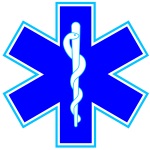Pediatric Ventricular Fibrillation or Pulseless Ventricular Tachycardia
From Protocopedia
Section 7 - PEDIATRIC / OBSTETRICAL
7.03 PEDIATRIC VENTRICULAR FIBRILLATION /PULSELESS VENTRICULAR TACHYCARDIA
- Initiate 5 cycles of high quality (30:2) one-rescuer or (15:2) two-rescuer CPR for approximately 2 minutes to allow blood to circulate and continue throughout resuscitation, minimizing interruptions.
- Maintain rate of between 100-120 compressions per minute.
- Maintain compression depth of at least 1/3 of the depth of the chest.
- Allow for complete chest recoil between compressions.
- Minimize interruptions
- Assist ventilations with OXYGEN @ 100% via BVM. DO NOT HYPERVENTILATE
- INTUBATE and establish peripheral IV or IO line as able.
- DEFIBRILLATION @ 2 J/kg.
- Proceed to next step only if V-Fib / Pulseless V-Tach persists.
- If rhythm converts, follow appropriate Practice Parameters.
Refer to Handtevy System for specific medication administration based on weight / length.
- EPINEPHRINE 1:10,000 (0.1mg/ml) 0.01 mg / kg IV /IO
- Repeat EPINEPHRINE 1:10,000 (0.1mg/ml) 0.01 mg / kg every 3 - 5 minutes of continued arrest.
- DEFIBRILLATION @ 4 J/kg. Continue CPR immediately.
- If rhythm converts, follow appropriate Practice Parameters.
- If hypovolemia suspected, fluid bolus 20 ml / kg.
- AMIODARONE 5 mg/kg, IVP or IO - refer to Broselow Tape for patient specific dose.
- OR
- LIDOCAINE 1.0 mg/kg IV / IO.
- DEFIBRILLATION @ 6 J/kg. Continue CPR immediately.
- If rhythm converts, follow appropriate Practice Parameters
- After 10 minutes, LIDOCAINE 1.0 mg/kg IV / IO.
- DEFIBRILLATION @ 8 J/kg. Continue CPR immediately.
- If rhythm converts, follow appropriate Practice Parameter
If V-Fib converts to a pulse-producing tachycardic rhythm, follow with LIDOCAINE boluses IVP.
